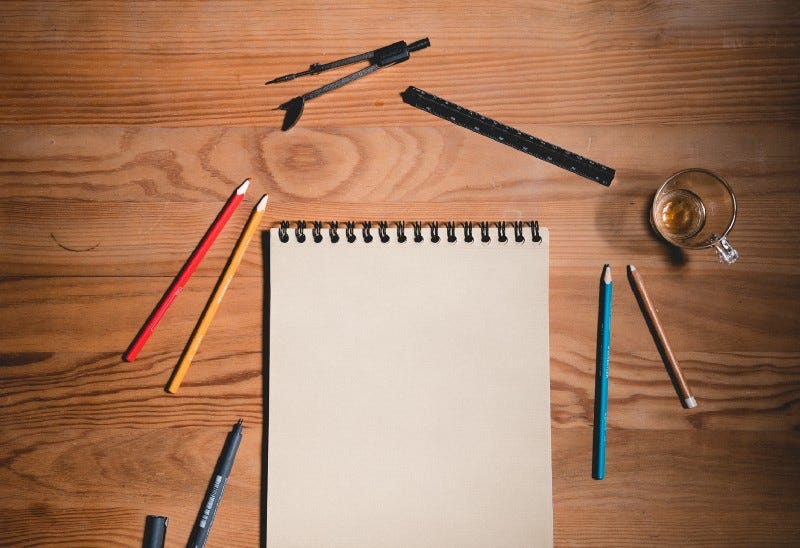Five steps I take when I’m feeling uninspired and stuck

Across the decades, writers have certainly done a lot to romanticize the condition called writer’s block, to make it sound foreboding and difficult to escape, but my strongest inclination is to say it isn’t real.
Sure, we all have days where the writing is harder than others, and yes, we all have moments when we fear that we’ve run out of meaningful, novel ideas to share with the world. But it’s pretty clear to me that the mythic status that “writer’s block” has taken on is both unearned and self-defeating. Like the belief that a writer can only make good work when “inspired”, the belief in writer’s block is a fiction that takes the responsibility for creating out of the writer’s hand, and puts it in the hands of some magical force outside of them entirely.
There isn’t much scientific support for the idea of writer’s block being a unique cognitive condition. The few studies that exist on the subject paint writer’s block as basically indistinguishable from procrastination or burnout, meaning it’s a usually-temporary state of low motivation that develops when a person fears criticism or has run out of mental energy because they’ve been working too hard. Beyond that, there aren’t really any psychological theories that explain the nature of writer’s block in a remotely satisfying way.
Most of the studies that examine potential “cures” for writer’s block are actually studies about how to improve the way writing is taught in classrooms. Usually, this involves encouraging teachers to be less critical and judgmental of their students, so that those students silence their inner critics, and express themselves more freely. This again suggests that writer’s block is nothing special— it’s just a momentary inhibition we can overcome by giving ourselves the permission to write imperfect drafts.
When we elevate the common frustrations of the creative process by labeling it “writer’s block”, we risk creating a self-fulfilling prophecy where our ability to create is trapped under some invisible barrier, and we are but passive, desperate victims waiting for it to be freed. I don’t think it ever has to be that way, no matter how stuck or scared we might feel. In my experience, there are always steps you can take to inspire yourself, motivate yourself, or give your brain the respite it needs before it can hit the keyboard again, fresh with new ideas.
Here are five writers-block-busting steps that have worked well for me over the years. They’re rooted in the assumption that writer’s block is no different from any other form of low motivation — and that therefore it can be cured through a blend of rest, and exposure to inspiring, novel ideas.
Read (a Lot)
I find that when my own writing is getting a bit stagnant, all I need to do is fill my own creative well back up with other people’s words. Reading is one of the best ways to remind myself of how varied and dynamic language is, of how many written forms and structures exist that I have the opportunity to play with. Reading also allows me to fall in love with writing all over again — reminding me why I bother with this whole navel-gazing, solitary endeavor.
Some of my best essay ideas bubble up when I’m halfway through a particularly transfixing page of someone else’s writing. I’ll be in the bathtub, halfway through a piece about the history of saunas, and suddenly I’ll get an idea to write about sensory overloads. Usually, my own idea has nothing to do with the work that I’m reading, and least not in an obvious way. For whatever reason, basking in the glory of another person’s effective writing allows my own writerly voice to assert itself more confidently. It feels like magic, but it’s not.
The more widely I read, the better and more complex my own thinking seems to be. So I read pretty widely, and in a very slapdash, chaotic way. Lately it’s been a blend of fantasy novels, short stories, poetry that I can barely comprehend, biographies of infamous scammers, self-help blog posts that make me cringe, and memoirs about addiction or surviving familial abuse. I find it’s as valuable to read bad writing as it is to read good — I learn a lot from the attempts that “fail”, and I often recognize my own worst, schlockiest impulses in other writers’ mistakes.
In her piece “An Essay About Essays”, Megan Stielstra talks about how the word “essay” originally meant “to attempt”; this type of writing is an exploration of an idea, and it may or may not accomplish what the author originally intended it to. She also suggests that the best way to learn how to write essays is by reading them. I agree. Every time I read something on Medium, for example, I learn a little bit more about the kind of work I want to create — and the kind I want to work like hell to avoid.

Experience Something New
Another thing that creatively refuels me is going to an entirely new place, or taking part in an utterly unfamiliar experience. Creativity is a process of forming new connections between ideas, or of seeing existing realities in a new light. When we expose ourselves to novel stimuli, or go through unique experiences or emotions, we’re more likely to think in creative and unconventional ways.
I wrote a book last fall, over the course of about two and a half months. One way that I managed to keep my creativity going throughout that whole process was by getting out of the house a lot, and having new conversations with new people. The nature of my book required that I interview a lot of folks — researchers, therapists, and sufferers of burnout, and more — and my own thinking and writing was vastly improved by drinking in so many new perspectives. I’m still contemplating the conversations I had now, and I’m sure many of them will continue to inform future writing.
Even something as simple as going to a new coffee shop can help get my creative juices flowing when I’m feeling a bit stuck. The new faces, the different lighting, the unique vibe all puts me in a slightly different creative space. And when I try something even less familiar — like going to a furry convention for the first time, or learning how to lift weights, I am left even more inspired and motivated to create.
I try to say “yes” to any experience that is totally new territory for me, even if it’s something I don’t want to make a regular habit of. Last summer, for example, I went with a friend to watch horse racing, even though I believed (and continue to believe) that racing horses is morally repugnant. It was a valuable anthropologic experience.
I haven’t written about going there yet, and I might never write about it, but going there still taught me a lot about how animal rights abuses can be hidden artfully from view and create the illusion of humane treatment. Knowing about that is valuable to me, and I’m sure it will inform my writing at some point.
Try a New Art Form
I’m primarily an essayist at this point, but I didn’t start out that way. Originally I was a strict academic, and only wrote journal articles and dry, authoritative chapters for academic books. I wrote a lot of long, passively voiced sentences. I used a lot of statistical and psychological jargon. I was productive, but I was miserable the entire time.
After a few years of that, I started writing a lot of fiction. Fiction provided me with a creative outlet that scientific writing never did, and every time someone read and enjoyed my short stories and novels, I felt fulfilled. But after a few years, I got a bit sick of sending short stories to literary magazines and self-publishing novels on Amazon. So I started putting an entirely different type of writing online — essays, which I posted to Tumblr and Medium. That was when my career as a writer started really taking off.
To this day, I have a wandering creative eye. I can’t just stick to the things I do well. I want to try other creative outlets too, especially when I’m feeling stuck. I love Medium, but I also love making memes. My mental-health-related essays do the best on here, but sometimes I’d much rather write personality profiles based on the Pokemon games instead. Sometimes I’d rather write bad poetry in a notebook. Hell, sometimes I’d rather draw or whittle or make slime.
When you expand your horizons and create new artistic work in a new medium, you can restore some of the joy that your original creative outlet gave you. I’m no poet, and never will be, and my memes are pretty mediocre — but practicing those shorter art forms makes me a pithier essayist. And sometimes, when you try out a new artistic form, you’ll find you have a knack for it.

Switch from Typing to Handwriting
Sometimes, all it takes to knock the mental cobwebs loose is switching from a computer to a notebook and a pen. I usually love typing directly into a Word document, but if I’m feeling kind of unfocused and unmotivated, I’ll try curling up in a chair with a legal pad. This switch tends to make it easier for me to generate new ideas — in particular if I’m at the brainstorming or outlining stages of the writing process.
Educational research has shown that writing by hand is a cognitively and neurologically different experience than typing on a computer. Different motor skills are used when writing by hand; it’s actually more mentally taxing to do write in this way than it is to type. Editing and rewriting is much more difficult when you can’t easily hit the “backspace” key. When people write by hand, they tend to produce a smaller volume of text than if they were typing. These can all be negatives — or they can also provoke a useful shift in a writer’s mindset.
When I write by hand, I’m not seeking perfection or immediate gratification. It’s slower and messier than typing — no matter how good my ideas are, I’ll have to go back over them and type them up eventually, if I want to be able to share them with anyone else. In that way, the handwritten word feels a bit more private and tentative. That allows for a lot free-form creativity, in my experience.
Because handwriting is slower than typing, it forces me to really meditate on what I’m trying to say. When I type, I often rush to get as much content out as possible; when I use a pen, it’s more about intentionally jotting down the most important words. And since I can’t delete or cut and paste what I’ve written, I can’t get as stuck in the mire of constant self-editing. When you write by hand, you just have to get the stray ideas out of your system, and then move on.
For all of these reasons, I love using handwriting as a way to explore new ideas and develop a rough outline for my work. It’s tentative, it’s informal, and it’s sloppy — which makes it perfect for low-stakes creativity.
Write Bad, Repetitive Crap
When a person says that they are suffering from “writer’s block”, what they often mean is that they have some ideas, but they think all of those ideas are unoriginal or unworthy. The solution to this is not to wait for a better idea to come around, but to get the “bad” writing out and on the page.
Most good writing starts out as bad writing. You have to create the clunky, meandering first draft before you can cut it down into something sharper and more incisive. You have to try — to essay — before you succeed. Some drafts, of course, never go anywhere. But that doesn’t mean you shouldn’t write them.
The best way to be a productive and distinctive writer is to write a lot — even when you don’t feel like it. Even when what you write is horrible.
Sometimes it takes me three or for bad stabs at a topic, over the course of years, to get it right. I’ve been making Facebook post and Twitter threads about why trying to “pass” as cisgender is self-defeating for well over a year; it was only after poorly articulating the idea a handful of times that I was able to write an essay about it. Similarly, I’ve written dozens of pieces about my dad’s death over the years. Some of those pieces were boring and self-indulgent. Some were really good. I had no way of knowing which was which until I put them out into the world.
…
The mythos of “writer’s block” would have us believe that when we doubt ourselves, it’s a sign we shouldn’t write. In fact, cause and effect flows in the exact opposite direction: when we don’t write, we feel like we have nothing of value to say. To resist this feeling, we can’t let our inhibitions guide us. Instead, we should place trust in our own writing abilities, surround ourselves with inspiring, novel experiences, try new artistic mediums, and let ourselves get some flawed words out onto the page. The less you believe in the power of being “blocked”, the less your doubts will rule your life.



